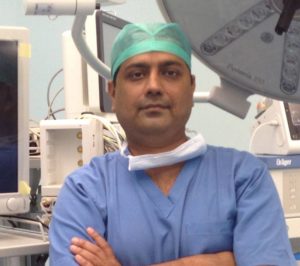FREQUENTLY ASKED QUESTION
Q? What does the term “total joint replacement” mean ?
Ans. A joint is made up by ends of at least 2 bones allowing movements.Total joint replacement means replacing both sides of the joint lining surface of the affected joint. When only one side is replaced this is called hemi ( half) joint replacement. In Total knee replacement, it means replacing both the thin joint lining (cartilage) upper end of the leg bone( tibia), and the thigh bone lower end (femur). Sometimes, the joint surface under the kneecap is also replaced. This requires removing the thin cartilage surface and a thin surface of bone for replacement with an artificial implant. Dr Bhardwaj specializes in reconstruction and replacement of the hip, knee, shoulder and elbow joints.
Q? How does joint replacement surgery work ?
Ans. This is performed to replace an arthritic or worn out joint with an artificial new joint. Most commonly replaced joints are the knee and hip, but with modern techniques and a highly trained surgeon can replace shoulders, elbows and ankles joints.Lining of the bone which is called as cartilage is a rubbery material that cushions the ends of bones and by minimising friction facilitates movement. Over time as joints get worn out , or after an injury, bones of the joint start rubbing together, a painful situation . Over the time with this friction and rubbing in the joint, bone spurs( extra bone formation) may form and the joint becomes stiff and painful. When patient can no longer control this pain and its interference with their lives with painkillers and other treatments like physiotherapy, Joint replacement is a well proven procedure to relieve patient of their pain and giving back their mobility, independence and life style.
Q? How long do artificial joints last ?
Ans. On average, Knee and hip joints have a lifespan of around 20 years. If you are having joint replacement surgery in younger age group like in your 40s or 50s when you, especially if you are very active, you are likely to need another joint replacement surgery later in life.
Q? What is Arthroscopic Surgery ?
Ans. A minimally-invasive procedure where surgeon uses a small camera ( a pencil thickness) connected to a high definition screen using small incisions to visualize and work in the joint. Arthroscopy is used to diagnose and treat wide range of joint problems, including those of the shoulder, elbow, knee, wrist, hip and ankle.As small key hole sized incisions are used, surgeon does not need to cut through muscles to zip open the joint, injury to soft tissues is avoided, facilitating quicker and less painful recovery times with almost no scars.
Q? What happens during rotator cuff surgery ?
Ans. Rotator cuff is a group of muscles around the shoulder which makes your shoulder move specially overhead activities. Surgical treatment of diseases or tear of these muscles involves one or more of the these procedures : debridement, sub-acromial decompression and repair of rotator cuff muscles.Debridement means taking out the damaged tissues and clearing the debris out of the shoulder joint.The rationale behind sub-acromial decompression involves shaving bone or removing spurs from undersurface the tip of the shoulder blade (acromion), creating more room for movement of upper arm bone thus avoiding pinching of rotator cuff tendon allowing smooth pain free movements.If the muscles of your rotator cuff tendon is torn, if possible it is reattached to its original place on the top of the upper arm bone. Dr Bhardwaj performs all of these procedure arthroscopically.
Q? What is an ACL reconstruction ?
Ans. ACL reconstruction is an arthroscopic ( key hole/ done through a small hole with camera) surgery for a torn anterior cruciate ligament (ACL), one of the most important ligaments that help stabilize the knee. The ligament is reconstructed using a tendon graft, taken from hamstrings from behind the knee or various other sources , which is then passed through the inside of the knee joint and fixed securely in the thigh bone (femur) and lower leg bones (tibia).
Q? If I see an orthopedic surgeon, will he generally recommend surgery ?
Ans. Most if not all, orthopedic injuries and conditions can be treated without surgery, using a range of treatments that include activity modification, physical therapy ,medications and injections. Surgery is a first and only option for certain orthopedic problems , otherwise surgery is reserved only for those conditions that do not respond to non- operative treatment.
HAVE ANOTHER QUESTIONS?
If you have more questions, You can book an appointment with Dr. Gaurav Bhardwaj at +91 – 8585 916 781 or You can book appointment online.

